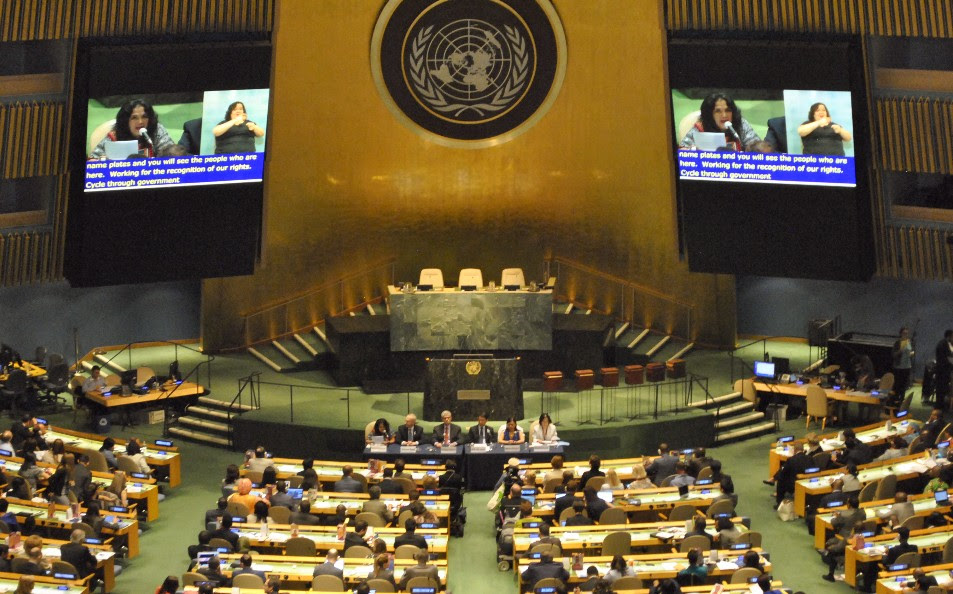Civil Society UNCRPD Forum 2016
13 June, 2016
On Monday, 13 June 2016, over 200 activists, advocates and representatives from across civil society as well as experts and representatives from governments and UN Agencies, gathered at the United Nations in New York for the annual Civil Society UNCRPD Forum.
The Forum precedes the Conference of States Parties to the United Nations Convention on the Rights of Persons with Disabilities (UNCRPD) and gives a space for open discussion and sharing of huge diversity of experience and perspective. This year not only marked the tenth anniversary of the signing of the UNCRPD, but also the first since the adoption of the 2030 Agenda and its Sustainable Development Goals (SDGs). The focus of the discussion therefore was on how persons with disabilities can and ought to be involved in the implementation of the SDGs.
The Forum was opened by H.E. Mogens Lykketoft, President of the General Assembly, H.E. Oh Joon, Permanent Representative of the Republic of Korea to the United Nations, who is serving as Chair of the Conference of States Parties Bureau, and currently President of ECOSOC, and Lenin Voltaire Moreno Garcés, the UN Special Envoy on Disability and Accessibility, who emphasized the importance of the role of persons with disabilities in global partnerships for implementing both the CRPD and 2030 Agenda. The opening was moderated by IDA's Chair, Maryanne Diamond.
There were then two main panel discussions. The first panel examined how contributions to the High-level Political Forum (HLPF) have been undertaken in the past, and future opportunities for engagement of persons with disabilities, their representative organisations and other civil society stakeholders.
Irena Zubcevic from the Division for Sustainable Development, UN Department of Economic and Social Affairs Major Groups and Other Stakeholders who discussed the stakeholder seat allocated for persons with disabilities, the history of the process and its current situation. Vladimir Cuk, the Executive Director of the International Disability Alliance discussed the Global Coordination Mechanism for Persons with Disabilities. Alistair S. de Gaetano from the National Commission for Persons with Disabilities Malta explained the process of the civil society submission to the HLPF. And Med Ssengooba from Disability Rights Fund discussed the opportunities presented by the HLPF for national DPOs. The open discussion was moderated by Catalina Devandas, the UN Special Rapporteur on the Rights of Persons with Disabilities.
Panel Two addressed the practical steps towards implementation of the CRPD and 2030 Agenda for persons with disabilities at global, regional and national levels. The Panel included Facundo Chávez Penillas from the Office of the High Commissioner for Human Rights discussing the intersection of human rights and development for persons with disabilities. Priscille Geiser, Chair of the International Disability and Development Consortium, introduced the 2030 Agenda Toolkit and Guide for Persons with Disabilities. Maribel Derjani-Bayeh discussed the role of the UN in achieving inclusive implementation from the perspective of UN Women. And Setareki Macanawai, CEO of the Pacific Disability Forum, discussed the importance of partnerships in implementation, in reference to Article 4.3 of the CRPD and inclusion of persons with disabilities. The Panel was moderated by Tim Wainwright, CEO of ADD International.
The Forum concluded with remarks by H.E. Stephan Tafrov, the Permanent Representative of the Republic of Bulgaria to the United Nations, Maria Soledad Cisternas Reyes, the Chair of the CRPD Committee, and the closing discussion was moderated by Mohammed Ali Loufty from Disabled People’s International Arab Region.


